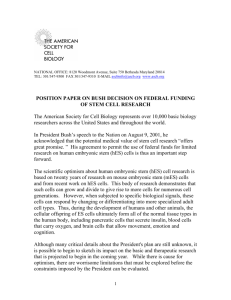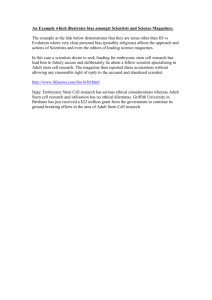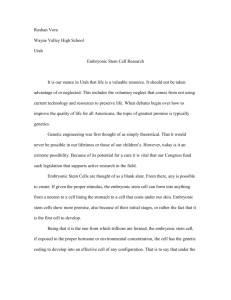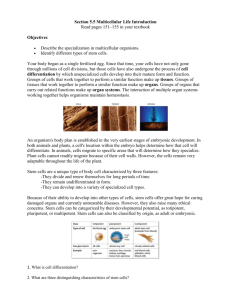Visual Identity Training Branding Concepts and Standards
advertisement
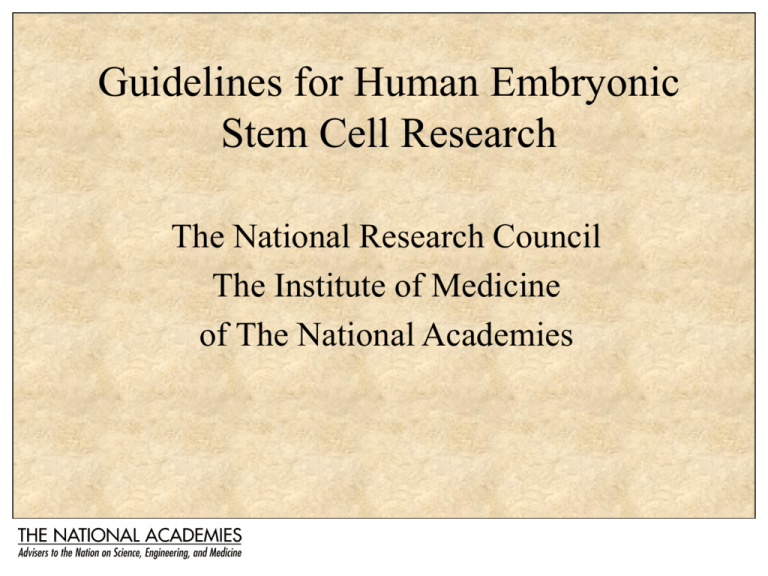
Guidelines for Human Embryonic Stem Cell Research The National Research Council The Institute of Medicine of The National Academies Committee on Guidelines for Human Embryonic Stem Cell Research Richard Hynes, Daniel K. Ludwig Professor of Cancer Research; Investigator, Howard Hughes Medical Institute; Massachusetts Institute of Technology (Co-Chair) Jonathan Moreno, Emily Davie and Joseph S. Kornfeld Professor of Biomedical Ethics; Director, Center for Biomedical Ethics; University of Virginia (Co-Chair) Marcia Imbrescia, Trustee, Arthritis Foundation Committee on Guidelines for Human Embryonic Stem Cell Research Elizabeth Price Foley, Professor of Law; Florida International University College of Law Norman C. Fost, Professor of Pediatrics; Director of the Program in Medical Ethics; University of Wisconsin H. Robert Horvitz, Professor of Biology; Investigator, Howard Hughes Medical School, Massachusetts Institute of Technology Terry Magnuson, Sarah Graham Kenan Professor and Chair of Genetics; Director, Carolina Center for Genome Sciences; University of North Carolina Cheryl Mwaria, Associate Professor of Anthropology; Hofstra University Janet Rossant, Joint Head; Program in Development and Fetal Health; Samuel Lunenfeld Research Institute; Mount Sinai Hospital, Toronto, Canada Janet Rowley, Blum-Riese Distinguished Service Professor of Medicine; Section of Haematology/Oncology; University of Chicago Medical Center Alta Charo, Elizabeth S. Wilson-Bascom Professor of Law and Bioethics, University of Wisconsin (Liaison to Board of Life Sciences) The Need for Guidelines • hES cell research already actively underway with both federal and non-federal funding - several states are initiating major research efforts • Significant public support for hES cell research • A patchwork of regulations – Limited federal support / little federal regulation – No federal regulations governing hES cell research funded from other sources – Disparate state regulations • No system for oversight of hES cell research • Uncertainty about appropriate procedures – Public concerns – Uncertain scientific environment Guidelines for Human Embryonic Stem Cell Research Statement of Task • Develop guidelines to encourage responsible practices in hES cell research, regardless of source of funding including the use and derivation of new stem cell lines i) derived from surplus blastocysts from IVF clinics ii) from blastocysts produced with donated gametes iii) from blastocysts produced using nuclear transfer. • The guidelines should take ethical and legal concerns into account and encompass the basic science and health science policy issues related to the development and use of hES cells for research and eventual therapeutic purposes Guidelines for Human Embryonic Stem Cell Research Issues Considered 1) 2) 3) 4) 5) 6) 7) Recruitment of donors of blastocysts, gametes, or somatic cells informed consent financial incentives conflicts of interest donor confidentiality risks associated with oocyte retrieval handling of genetic information arising from the research Characterization and standardization of stem cells Safe handling and storage of blastocysts and stem cell material Conditions for transfer of such material among laboratories Appropriate uses of hES cells in research or therapy Limitations on the use of hES cells Safeguards against misuse Guidelines for Human Embryonic Stem Cell Research NATIONAL ACADEMIES GUIDELINES FOR RESEARCH ON HUMAN EMBRYONIC STEM CELLS • 1.0 Introduction • 2.0 Establishment of an Institutional Embryonic Stem Cell Research Oversight Committee • 3.0 Procurement of Gametes, Blastocysts or Cells for hES Generation • 4.0 Derivation of hES Cell Lines • 5.0 Banking and Distribution of hES Cell Lines • 6.0 Research Use of hES Cell Lines • 7.0 International Collaboration • 8.0 Conclusion and Need for a National Panel Guidelines for Human Embryonic Stem Cell Research 1.1(a) What The Guidelines Cover These guidelines cover all derivation of hES cell lines and all research that uses hES cells derived from (1) Blastocysts made for reproductive purposes and later obtained for research from in vitro fertilization (IVF) clinics. (2) Blastocysts made specifically for research using IVF. (3) Somatic cell nuclear transfer (NT) into oocytes. Many, but not all, of the guidelines and concerns are common to other areas of human stem cell research, such as (a) Research that uses human adult stem cells. (b) Research that uses fetal stem cells or embryonic germ cells derived from fetal tissue Guidelines for Human Embryonic Stem Cell Research 1.1(b) Reproductive Uses of Nuclear Transfer The guidelines do not address reproductive uses of nuclear transfer - those are addressed in the 2002 report Scientific and Medical Aspects of Human Reproductive Cloning, in which the National Academies recommended that “Human reproductive cloning should not now be practiced. It is dangerous and likely to fail.” Although the guidelines do not specifically address human reproductive cloning, it continues to be the view of the National Academies that research aimed at the reproductive cloning of a human being should not be conducted at this time. Guidelines for Human Embryonic Stem Cell Research Donations of blastocysts, oocytes, sperm and somatic cells • Should always be reviewed by an Institutional Review Board • Should be governed by informed consent of all donors • Separation of decision to donate from all clinical decisions • No payments to donors beyond reimbursement of direct expenses • No purchase or sale of donated materials • Protection of donor privacy Guidelines for Human Embryonic Stem Cell Research Recommendations for Oversight of Human Embryonic Stem (hES) Cell Research 1. Local oversight - each institution should establish an Embryonic Stem Cell Research Oversight (ESCRO) committee to review and monitor all proposals to conduct hES cell research. The committee should include representatives of the public and persons with expertise in developmental biology, stem cell research, molecular biology, assisted reproduction, and ethical and legal issues in hES cell research. 2. A national panel should be established to assess periodically the adequacy of the guidelines and to provide a forum for a continuing discussion of issues involved in hES cell research. • politically independent and without conflicts of interest • respected in the lay and scientific communities • able to call on suitable expertise to support this effort. Guidelines for Human Embryonic Stem Cell Research Functions of Embryonic Stem Cell Research Oversight (ESCRO) Committees - #1 • • • • • • To provide local oversight over all issues related to derivation and research use of hES cell lines To ensure adherence to the basic ethical and legal principles of informed consent and protection of donor confidentiality. To review compliance of all hES cell research with all relevant regulations and guidelines. To maintain registries of hES cell research conducted at the institution and of all hES cell lines To facilitate education of investigators involved in hES cell research The ESCRO committee will not substitute for an Institutional Review Board (IRB) but rather will provide an additional level of review and scrutiny warranted for hES cell research and review proposals not requiring IRB review. Guidelines for Human Embryonic Stem Cell Research Functions of Embryonic Stem Cell Research Oversight (ESCRO) Committees - #2 • To review and approve the scientific merit of research proposals and divide into three categories in setting limits on research and determining the requisite level of oversight: (a) Research that is permissible after notification of the ESCRO committee and completion of all reviews mandated by current requirements; e.g., all purely in vitro hES cell research with pre-existing coded or anonymous hES cell lines. (b) Research that is permissible only after additional review and approval by the ESCRO committee (i) all derivations of new hES cell lines from donated blastocysts, from in vitro fertilized oocytes, or by nuclear transfer. (ii) all research involving the introduction of hES cells into nonhuman animals at any stage of embryonic, fetal, or postnatal development. (iii) all research in which identifiable information about donors is readily ascertainable or could become known by the investigator Guidelines for Human Embryonic Stem Cell Research (c) Research that should not be permitted at this time: (i) Research involving in vitro culture of any intact human embryo, regardless of derivation method, for longer than 14 days or until formation of the primitive streak begins, whichever occurs first. (ii) Research in which hES cells are introduced into nonhuman primate blastocysts or in which any ES cells are introduced into human blastocysts. (iii) No animal into which hES cells have been introduced at any stage of development should be allowed to breed. Guidelines for Human Embryonic Stem Cell Research Mechanisms for Ensuring Compliance To help ensure that these guidelines are taken seriously, stakeholders in hES cell research—sponsors, funding sources, research institutions, relevant oversight committees, professional societies, and scientific journals, as well as investigators—should develop policies and practices that are consistent with the principles inherent in these guidelines. Funding agencies, professional societies, journals, and institutional review panels can provide valuable community pressure and impose appropriate sanctions to ensure compliance. ESCROs and IRBs should require evidence of compliance when protocols are reviewed for renewal Funding agencies should assess compliance when reviewing applications for support Journals should require that evidence of compliance accompanies publication of results Guidelines for Human Embryonic Stem Cell Research Committee on Guidelines for Human Embryonic Stem Cell Research Richard Hynes, Daniel K. Ludwig Professor of Cancer Research; Investigator, Howard Hughes Medical Institute; Massachusetts Institute of Technology (Co-Chair) Jonathan Moreno, Emily Davie and Joseph S. Kornfeld Professor of Biomedical Ethics; Director, Center for Biomedical Ethics; University of Virginia (Co-Chair) Marcia Imbrescia, Trustee, Arthritis Foundation Frances Sharples, Study Director Kathi Hanna, Science Writer Matthew McDonough, Program Assistant

